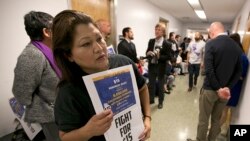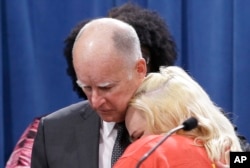California's hike in the minimum wage to $15 an hour, to take effect over the next six years, could help more than five million workers as its effects ripple through the economy, says supporter Ken Jacobs of the Center for Labor Research and Education at the University of California, Berkeley. Business groups oppose the increase, and analysts are divided. Some say small businesses will struggle with the increase and consumers will be hit with higher prices, while others say the pay raise will boost the economy.
California Governor Jerry Brown announced the agreement between labor and legislative leaders Monday, and legislators are soon expected to pass the bill and the governor will sign it into law.
The measure would raise minimum pay for the states workers in increments to $15 an hour by 2022 for large businesses, and 2023 for smaller ones. That's more than double the current national minimum of $7.25 an hour. Cities and states can set their own base wage, and California's is now $10 an hour. Governor Browns office says more than two million workers in his state are paid at that rate, and that the pay hike is “a matter of economic justice.”
The agreement is the latest victory in the drive by labor activists to raise the pay of the nation's lowest-paid workers, who are often employed in fast food restaurants or at other service jobs. The effort began with protests and marches in 2012, and has been successful in such cities as Seattle, San Francisco and Los Angeles. California is the first U.S. state to raise its minimum wage to the $15 level, and New York is debating a similar proposal.
The U.S. Chamber of Commerce and other business groups say a higher minimum wage will hurt low-skilled workers by forcing companies to eliminate jobs. They say wage inequality is a complex issue that is better addressed by improving workers' skills to make them more competitive in a global marketplace.
Fast food restaurants in California could see their operating costs increase 13 percent as the raise is implemented, said analyst Shon Hiatt of the University of Southern California. He said restaurants owners have three options: raising food prices, shrinking portion sizes, or increasing automation to reduce their labor costs. He says we will likely see a combination of all three. He adds that increased costs for food production on California farms could drive up costs further, and that agricultural jobs could be lost from California to Mexico.
Analyst Ken Jacobs said the higher wage will keep worker turnover low and productivity high. In a conference call with reporters, he said the net effect will be positive, as workers pay more taxes, contribute to the economy and reduce their need for public benefits.
Others say a “one size fits all” solution does not take account of varying conditions in different communities. The state of Oregon, to the north of California, will raise its minimum wage to just under $15 by 2022 under a law signed March 2. The highest rate applies only to the major urban region of Portland, however. Mid-sized counties and rural areas will have lower minimums, which is important for communities that are struggling economically, says economist Tim Duy of the University of Oregon. He questions whether $15 an hour is “the right minimum wage for a more rural community in northeastern California?”
Lisa Scott, a home care provider for the elderly and disabled in California's rural El Dorado County, earns $11 an hour and says the increase will let her save to visit her five-year-old grandson in Arizona for the first time. Long Beach janitor Esperanza Velasquez says the pay hike will help pay a $21,000 bill for cancer surgery. Both have been active in the campaign for the wage boost.
The national minimum wage has been locked at $7.25 an hour for more than six years, and Republicans in Congress have opposed efforts to raise it, concerned about a dampening effect on the economy. Democratic presidential candidate Bernie Sanders has embraced the $15 dollar minimum and Democratic hopeful Hillary Clinton supports $12 an hour as a national base.
The economic effects are far from certain, insists Tim Duy of the University of Oregon, who says “there has been so much conflicting research on ...the actual impacts.” In fact, he says, “the fastest way to start a fight in an economics department is to talk about the minimum wage.”
The drive for a $15 an hour minimum is spreading around the country. New York Governor Andrew Cuomo has included the proposal in his annual state budget, and New York lawmakers are now debating the issue.





